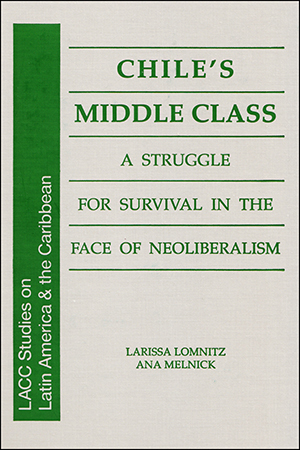
- 1991/61 pages
- LACC Studies on Latin America and the Caribbean
Chile's Middle Class:
A Struggle for Survivial in the Face of Neoliberalism
Over the past ten years, most Latin American countries have experienced dramatic economic changes as a result of their enormous debt burden, with a diminished economic role for the state and a consequent drastic cut in state social expenditures. The authors of this provocative book explore the clearly negative impact of these changes on the middle class in Chile, where the military government was able to take draconian measures in applying the neoliberal model, without fear of political opposition.
Lomnitz and Melnick take as their case the transformation of the economic and social position of Chilean educators between the early 1970s and the late 1980s. As Chile's education system was decentralized, teachers lost all job security and saw their wages and working conditions decline. The quality of public education suffered, as well.
The authors are especially concerned with transformations in the teachers' social networks, finding them comparable now to those typical in a Mexican shantytown, as opposed to more traditional middle-class networks. Their statistical data enable the reader to grasp the broad sweep of contemporary middle class Chilean reality, while the personal stories they retell—revealing the voices of people who feel that their position and their dignity have been undermined—give life to this reality as experienced by individual Chileans.





